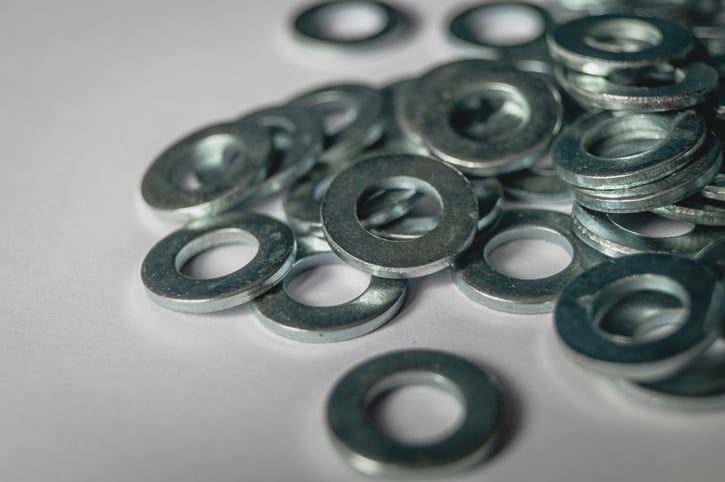Understanding The Difference Between U.S.S. and SAE Flat Washer Patterns
The main difference between U.S.S. and SAE pattern flat washers is their outside diameter (OD). For a given inside diameter (ID), a U.S.S....

Choosing washers is an essential yet overlooked part of a project. They're among the most common fasteners used in the industry. It may seem simple, but it can be tedious and time-consuming. It's a process that needs careful consideration. For instance, if you want to do it right, there are a lot of factors to consider when choosing rounded plate washers.

At Big Bolt, we can manufacture flat washers and source spring and lock washers. That being said, we want to make sure that you understand what all of your options are.
In this guide, we'll walk you through everything you need to know about rounded plate washers to make the selection process easier. Read on to learn more about the different types of washers and their applications.
Standard washers are versatile fasteners that are fundamental in a wide range of applications. These are thin, round plates with a hole in the center. Rounded plate washers are just a little oversized. Other shapes can be used too, but the rounded plate washer is the most common.
Rounded plate washers have many purposes in the mechanical world. Washers are usually fitted on a stud or bolt before tightening the nut and bolt. Their primary function is to ensure that the nut is pressed against a smooth surface to reduce the chances of loosening over time.
Washers also distribute the pressure of the nut evenly over a surface, minimizing scouring or scratch damage to the surface as a result of nut rotation. Sometimes screws get stuck when a washer is not used. The screw ends up tighter than it's supposed to because it's sitting on an uneven surface.
What's the most common application for rounded plate washers? Rounded plate washers are typically used in wood construction and marine applications. They keep the bolt heads and nuts from pulling into the wood.
Typically used in timber construction and the marine industry, rounded plate washers are oversized to provide a larger bearing surface than the standard flat washer. But there are many other types of washers. It's essential to understand the different types of washers and their applications to choose the right kind of washer for the task at hand.
Here are some of the most common types of washers:

Although there are many other types of washers, most of the washers you come across can be classified as plain, locking, or spring.
Washers come in a vast range of materials. However, rounded plate washers are typically made of carbon steel because of their incredible strength. When combined with steel, carbon creates a solid material that can withstand the various mechanical applications of fasteners and washers.
Another common material used to make washers is stainless steel. It's not as strong as low-carbon steel, but it's rust and corrosion-resistant, which carbon steel lacks. In addition to stainless steel and low-carbon steel, washers are also available in materials such as aluminum, copper, bronze, brass, and more.
Remember, at Big Bolt, we can make flat washers and supply spring lock washers. That means you can consider Big Bolt for all of your fastener needs. We can provide almost any type of washer you need for your next project. From stainless steel to copper washers, our inventory is one of the largest in the industry. If it's not in stock, we'll manufacture it and ship it to you immediately.
The main difference between U.S.S. and SAE pattern flat washers is their outside diameter (OD). For a given inside diameter (ID), a U.S.S....
If you’re wondering what materials are used to make quality fasteners, you care a lot about the products you purchase.
In the world of construction, manufacturing, and various industrial applications, metal fasteners play a crucial role. They are the unsung...